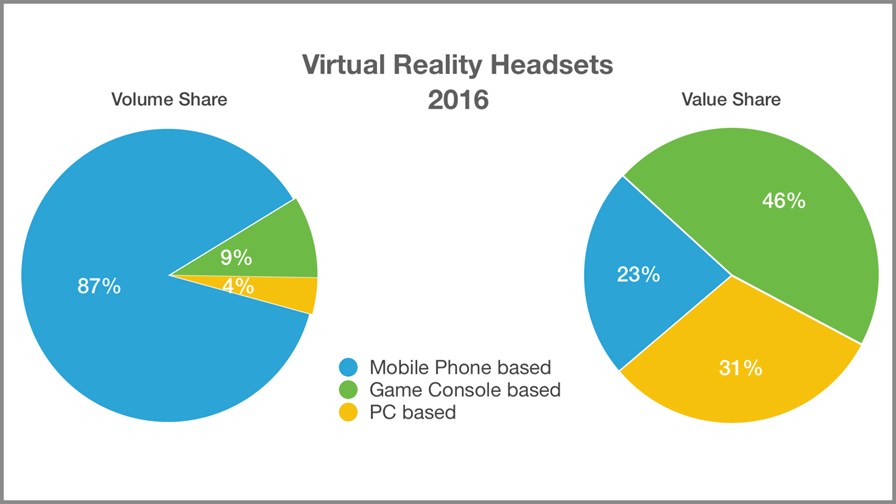
© Strategy Analytics
- Global VR headset revenues will reach $895 million in 2016
- Oculus, HTC and Sony will only account for 13 per cent of volumes in 2016
- High-end headsets tethered to PCs and Consoles will barely exceed 1.7m devices in 2016
- Smartphone-based viewers a “gateway drug” to upsell users to better VR experiences
Top of the telecoms hype-curve at the moment are virtual reality (VR) and augmented reality (AR). If we believe the associated hype, then VR and AR will become the next big messaging and development platforms, supported of course by mobile networks. In fact, VR and AR come a close second to the Connected Car in lists of emerging services that will need 5G networks to flourish.
But we are still some way off 2020 and the first commercial appearance of standardised 5G networks. Until then, both VR and AR need to mature as viable mass-market platforms. However, there are promising signs, as anyone attending this year’s MWC event would conclude – plenty of buzz, lots of early development work, and apparently no shortage of early stage funding.
According to new research from Strategy Analytics, global VR headset revenues will reach $895 million in 2016 with 77 per cent of that value accounted for by newly launched premium devices from Facebook-owned Oculus, HTC and Sony. These three brands, however, will only account for 13 per cent of volumes in 2016, as lower priced smartphone-based devices will dominate share of the 12.8 million unit virtual reality headset market.
The analyst firm sees 2016 as a pivotal year for virtual reality given a confluence of factors, and also one where managing expectations will be paramount given a dearth of available content and the technical limitations of entry-level virtual reality.
“Consumers will soon be exposed to an incredible diversity of VR options ranging from ultra-low cost to super premium,” said Cliff Raskind, Director of Strategy Analytics’ Wearable Device Ecosystems service. “While we expect smartphone-based viewers to take the lion’s share of VR headset volumes in 2016 at 87 per cent of shipments, PC and Game Console powered headsets will absolutely dominate value share, commanding 77 per cent of revenues. Additionally, we believe VR has the potential to fuel a new tech spec race in hardware areas such as display resolution, GPUs, storage and 360° cameras.”
Strategy Analytics predicts that state-of-the-art VR headsets tethered to PCs and Game Consoles will barely exceed 1.7 million devices shipped globally in 2016 due to prohibitively high pricing. At the same time, smartphone vendors are toting low cost and bundled-in VR viewers, which Strategy Analytics believes can serve as an effective “gateway drug” to upsell users to higher quality VR experiences later.
Game consoles are driving the hardware and software that will be most visible to consumers in 2016, but beyond the diehard gamer sector, major investment has also been directed towards enabling virtual experiences such as entertainment and sports, marketing and product retailing, and education. In addition, social and peer-to-peer communications are seen by Facebook and enterprise IT firms as promising areas for VR.
Email Newsletters
Sign up to receive TelecomTV's top news and videos, plus exclusive subscriber-only content direct to your inbox.




